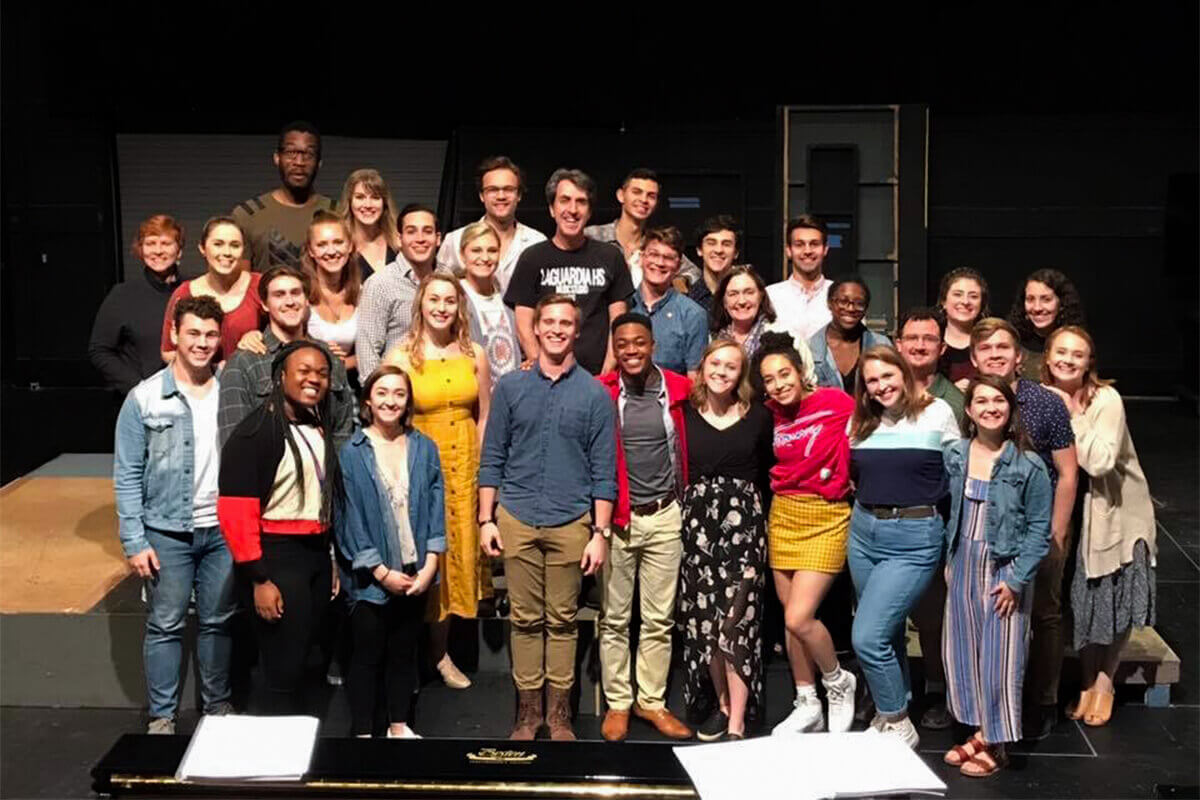Tony Award-winning Broadway composer Jason Robert Brown visited Shenandoah Conservatory on Wednesday, Sept. 17, and Thursday, Sept. 18.
During his visit, Brown was the featured guest at the conservatory’s Performance Forum, an exclusive one-on-one student engagement opportunity with visiting artists for conservatory students. Assistant Dean for Student Learning and Associate Professor of Theatre Carolyn Coulson, Ph.D., and Director of Composition, Coordinator of New Music and Associate Professor of Composition Jonathan Newman, M.M., interviewed him about his work and creative process. Students were invited to ask questions at the end of the interview.
He also hosted a musical theatre vocal masterclass where students performed excerpts from major productions for feedback in a group setting, participated in a rehearsal for “Parade,” directed by Coulson, which will be presented at Shenandoah Conservatory from Thursday, Oct. 24, through Sunday, Oct. 27, in Glaize Studio Theatre, and led a cabaret planning seminar for composition students.
…I spent my night at ‘Parade’ rehearsal with the man who WROTE ‘Parade,’” said Grace McLaughlin ’20 (Bachelor of Fine Arts in Musical Theatre). “There truly aren’t many words to explain this experience other than passionate, inspiring and magical. To be conducted by the man who wrote the music was electrifying and in my opinion the best thing this school has ever given us. To hear this man talk to us on the most down-to-earth level about the show and what we needed to know was again just electrifying and inspiring.
He left me with great feedback to work on and brought my attention to things I had never heard before. He reminded me that our job is tricky and the only way to get better is through PRACTICE,” said Dorian Davis ’20 (Bachelor of Fine Arts in Musical Theatre).
Davis noted that Brown also understood that the piece and its racially charged story can create complicated reactions for performers – particularly performers of color. However, Davis, who is a performer of color, said he loved how Brown encouraged dialogue about the piece’s issues, and how the composer assured performers of color that “‘The point is never to make you feel excluded from the storytelling but it’s also not to make you feel complicit to storytelling that you’re like not ready to tell, ya know?’”
Brown’s visit culminated Thursday evening in a rare cabaret-style concert featuring the songs and stories behind “Parade,” “The Last Five Years,” “Bridges of Madison County” and more in Ohrstrom-Bryant Theatre.
Getting to work with Jason Robert Brown in preparation of playing Leo Frank in Parade was truly eye opening and an overall inspiring experience for me,” said Jacob Cornelius ’21 (Bachelor of Fine Arts in Musical Theatre). “Jason was a master in his ability to convey to me the feelings of the characters and the message behind the lyrics. His insight into the story and how he created the music behind these historical characters was truly priceless. He worked with me mostly on my character and challenged me as an actor to look deeper into my role, but also to look at the intricacies of the problems that these characters had to face as a whole. More importantly, he expressed why the story of ‘Parade’ needs to be shared today because we are still having the same racial profiling and discrimination issues that our society faced over 100 years ago, only with a slightly modern face. I will forever cherish this experience that has changed me forever.
About Jason Robert Brown
Jason Robert Brown is the ultimate multi-hyphenate—an equally skilled composer, lyricist, conductor, arranger, orchestrator, director and performer—best known for his dazzling scores to several of the most renowned musicals of his generation, including the generation-defining “The Last Five Years,” his debut song cycle “Songs for a New World,” and the seminal “Parade,” for which he won the 1999 Tony Award for Best Score. Originally trained as a concert composer, Brown’s music is infused with so much keen sophistication that The New York Times referred to him as “a leading member of a new generation of composers who embody high hopes for the American musical.”




